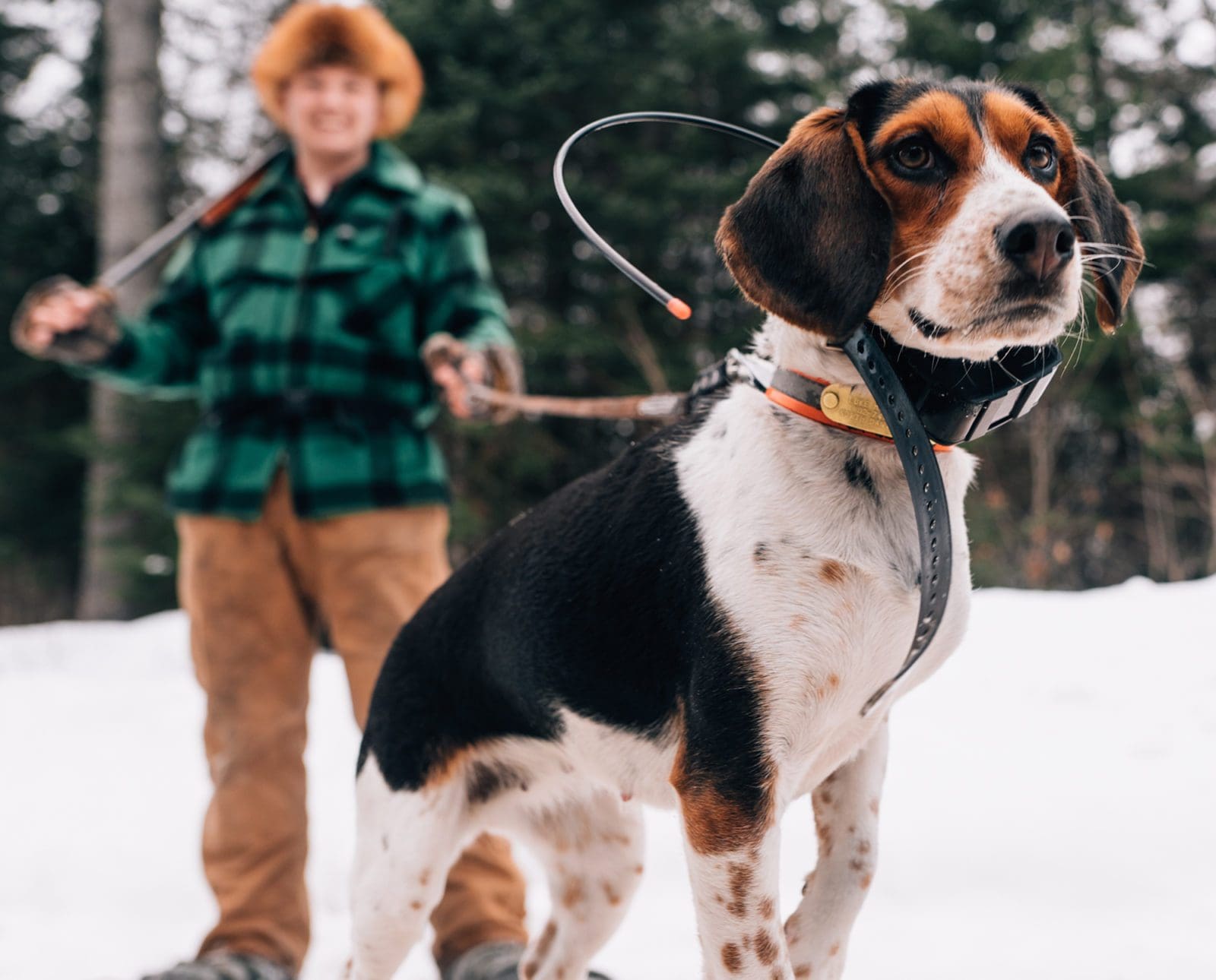Home » Hunting Policy » New Hampshire Beagle Clubs in the Crosshairs as State House Pushes Bill to Ban Live Snowshoe Hare Trapping
New Hampshire Beagle Clubs in the Crosshairs as State House Pushes Bill to Ban Live Snowshoe Hare Trapping

Andrew Spellman is an award-winning photojournalist and author. A 2017…
Though New Hampshire was home to another legislative push by anti-hunting advocates, HB 1308 has been killed in committee
CONCORD, N.H. — Another long-standing hunting tradition is threatened in New England, this time centered in the woods of New Hampshire.
House Bill 1308, introduced Jan. 5 by representatives Edith Tucker (D) and Dennis Thompson (R), is a direct attack on responsible and ethical dog breeding practices, safe dog training environments, and would destroy an invested user base that utilizes the state’s natural resources.
Call to Action and Key Dates
Tuesday, Jan. 25: HB 1308 was effectively killed by an 18-1 bipartisan vote in the House Fish and Game and Marine Resources Committee.
Tuesday, Jan. 25: HB 1308 will be voted on by the House Fish and Game and Marine Resources Committee Email members of the committee to make your position known. 1. Use the following email HouseFishandGameCommittee@leg.state.nh.us 2. Tell members of the committee that you OPPOSE HB1308 3. Any personalized message in the email helps! 4. At minimum cut and paste the following: Dear House Fish and Game and Marine Resources Committee, I am reaching out as a member of the public to OPPOSE HB1308 as it is a direct attack on responsible and ethical dog breeding practices, safe dog training environments, and would destroy an invested user base that utilizes the state's natural resources. There are already rules in place to ensure the health and treatment of the snowshoe hare in New Hampshire as it pertains to Beagle Clubs. This bill only seeks to destroy our state's rich heritage in hunting and to single out a vulnerable part of our hunting community.
Friday, Jan. 14: the bill heard testimony but the vote was postponed till January 25th.
Tuesday, Dec. 14, 2021: New Hampshire Fish and Game Commission voted to oppose this bill 10 to 1.
Share this article on social media and with anyone you may know that lives in New Hamshire to give them the proper information to oppose this bill.
If passed, HB 1308 would prohibit the “capture, possession, and propagation of hares and rabbits for hunting dog training and field trials.” The introduction of the bill comes months after New Hampshire’s neighbor, Vermont, introduced legislation that would limit or ban hounding for bears, both purposeful attacks on hunting culture.
Yet, what exactly is at stake? According to the American Kennel Club, which is affiliated with a number of beagle clubs in the state, should the passage be successful, it would “effectively prohibit beagle clubs from continuing to host field trials and revoke the clubs’ New Hampshire Fish and Game permits allowing the capture of 20 wild hare annually for purposes of training their scent hounds.”
Conversely, a New Hampshire-based activist group, Voices of Wildlife in New Hampshire, supports the bill, claiming, “The capture and relocation of snowshoe hares causes many problems for these animals and can even be a death sentence. Snowshoe hares need particular habitat to survive. They need heavy thicket areas to hide from predators, as well as sufficient time to find the best places to hide. The clubs admit predation does occur by birds of prey and at least at one club by bobcats.”
The truth, however, may be much less doom-and-gloom, as practitioners of live-trapping hares for training purposes explain the process is not cruel, as the hares are not harmed during the trapping process or purposely during training and field trials and clubs are required to maintain strict health guidelines for the animals. In a testimony by the Northeast Beagle Gundog Federation—an organization comprised of 40 beagle clubs across multiple states—it notes, “Prohibiting New Hampshire’s five beagle clubs to maintain sufficient populations of hare on their training areas would essentially destroy these clubs, forcing them to close their doors to members and competitors. Closing these clubs would result in loss of tourism; loss of economic benefits to local, rural economies; loss of recreational opportunities and loss of important land conservation benefits.
“Proponents of House Bill 1308 cite cruelty and clubs’ inability to properly care for hare as reasons to ban trapping and possession of hare and rabbits. Consider that the object of beagle training and field trials is to develop and promote skill in trailing hare and rabbits, not to capture or kill them. Clubs are greatly invested in sustaining sufficient game populations on their grounds. Thousands of dollars are spent annually at these clubs to improve hare habitat. … New Hampshire currently has more restrictive regulations concerning trapping of hare and rabbits than any other state. No other state has limits on the number of hare trapped and relocated or a requirement for a veterinary inspection.”
But for someone right in the middle of the fight, David Price, President of the New Hampshire Beagle Club, believes that all of the opposition is due to misinformation and preconceived ideas.
“I think some the people think we’re taking the hares to the pen, dump them out of the box , and let the dogs run them down until they catch them and kill them,” said David Price, President of the New Hampshire Beagle Club. “They think that’s the way it is; they don’t realize our dogs are running on scent. Very rarely do they ever put eyes on it unless they’ve got a big, open area, but within seconds that hare is gone. I’ve watched my dogs every week; a hare will run up to me, scratch its ear, nibble on a bush, wait for the dogs to get close, and take off. He’s not stressed at all; he’s got the advantage on my dogs who run 8 to 9 mph.”
So then, for such a hot-button issue, what are the facts?
Background on live-trapping hares in New Hampshire
According to New Hampshire Administrative Code Chapter Fis. 806.05, which deals with the propagation of wildlife, those wishing to live-trap snowshoe hares must follow a laundry list of regulations.
Of the rules, the most important is that it has to be done in the open, regulated season with no more than 20 hares trapped per season; done only with box traps with weatherproof tops and enough food to sustain the animal for at least 24 hours; and traps must be checked daily. Further, clubs that keep trapped hares or their offspring in a manner that meets the requirements of state code (Fis. 804), and relinquish one or more hares once a year for veterinary checks to make sure the animals are in good health. It is also important to note that hares are not killed at the beagle clubs.
How did this come to be, though? According to Price, before, clubs could get hares from Canada but when the border was closed for transporting animals club representatives went to the state’s Game and Fish leaders in 2007 to allow trapping. Thus, if the practice is taken away, they won’t have any way to get the animal for training and trials.
What’s at stake if the HB 1308 passes?
There’s more in the way of consequence than just clubs losing the ability to trap snowshoe hares. Price explained that the ramifications would not only shut down the clubs in the state—two years was his prediction—but it would also impact local economies.
“We pay for a lease on our property—we have a 20-year lease—so those people would lose their money,” he said. “The insurance company that we pay would lose their money; the local grain store down the road where we get grain for the hares, they would lose their money; the pen place would lose money if we aren’t buying supplies for repairs; it would all trickle down.”
From the standpoint of tradition, many hunters, trainers, and devoted field trial participants would also suffer.
“I’m primarily a hunter, so I’ve been hunting around beagles since I was 13 years old,” Price said. “We have a lot of guys in the club that do the trials, but that was brought down from their fathers, too. It’s like an active sport; some of the guys … will travel all over the New England states to run their dogs in these trials. And the hounds have been run for hundreds of years.”
Further, the breed would suffer. To maintain skillsets, whether bred for trials or hunting, dogs must be trained and put to work continuously. Thus, without access to the training component, beagles would eventually lose their keen abilities. And it should be noted that beagle clubs and those who are part of them are the antitheses of what some colloquially call, “puppy mills.”
“These guys that have good dogs, if they don’t have a place to run they aren’t going to breed their dogs,” Price noted. “They’re not out to make a bunch of puppies. The only reason they’re breeding is to get a better pup out of the deal. They’ll keep one for themselves and the other ones they’ll sell. So if they don’t have a place to run they’ll get out of the game and quit breeding, then you’ll lose all the decent dogs that have been working.”
Do hares die?
While Voices of Wildlife clings to the notion that hares die while at pens or during field trials, both are uncommon. Price admitted that some captured hares or progeny of captured hares are killed by predators—“We’re not eliminating the wildlife from getting at them, which is tough to fence a tall fence over 100 acres,” he said—but the facilities are much better than that of the wild. Plus, hares are heavily predated upon in the wild.
Voices of Wildlife also claims, “As is commonly known, the sustained flight response in a hare can result in death. When they are preyed upon or chased by groups of beagles before becoming familiar with the terrain, snowshoe hares can literally die of fright.”
But this is conflated. It is not the goal of field trials or training to kill or injure hares, as noted in the NBGF’s testimony.
“Killing or injuring hare through training or field trials is absolutely discouraged,” the testimony reads. “Clubs provide supplemental feed and habitat improvements to the benefit of their hare, with the object of promoting survivorship and reproduction. Our activities are not the blood sport portrayed by misinformed activists. Hare are allowed weeks to acclimate to their spacious habitat before dogs may be trained or field trials held on the grounds. Hare are far too difficult to acquire to accept any losses.”
And while hares can die during large-scale trials, Price notes it’s rare.
“I’m not going to tell you it doesn’t, it does, but it’s not at every trial you go to,” he said. “That could happen maybe, three times out of 20 every time you have a trial.”
To Price, a major problem and thus large motivation behind the bill is that younger people aren’t educated or have been separated from the culture.
“You’ve got less people hunting and less people bringing their kids up hunting, so the younger generation just doesn’t know anything about it,” he said. “There’s not enough insight on it. And you’re getting more and more houses developed and people from down south are moving here. With COVID … people down south wanted to get away from the big cities, and once they come they want to bring the city with them. They’ve never seen a dog chasing something.
“That’s the way I see it, they don’t know that you can let your dogs go and do what their purpose is. That art is getting lost, and that’s why they’re putting the pressure on us.”
What’s next?
Currently, HB 1308 sits in the Fish and Game and Marine Resources Committee. On Jan. 14, a hearing will be held concerning the bill, likely with multiple groups there in support or in opposition of the bill. It’s planned that representatives of the American Kennel Club and Congressional Sportsmen’s Foundation will provide testimony against altering the state code.
Suggesting it could be a lost art in as little as 100 years, Price noted he wants to see the tradition remain.
“We just need to be able to keep our 20 hares that we’re allowed to trap,” he added. “I’ve got young kids growing up and I’d like to see them involved in it.”
When given the chance to have the last word, Price reiterated that, by no means, are hares being compromised.
“Our hares aren’t getting run down,” he said. “We’re feeding them and watering them during the dry spell, we have all the cover that they have in the wild, and the only reason we need to re-trap is because we still have the hawks, owls, and occasional bobcat that will come up over the fence.”
Andrew Spellman is an award-winning photojournalist and author. A 2017 graduate of West Virginia University's Reed College of Media, Andrew's work has appeared in multiple newspapers and magazines. He is also an avid hunter and angler who enjoys chasing varying game in his pocket of Appalachia.




So glad we picked up and moved West a few decades ago. Though the seeping bambi mentality has crept out here as well, particularly in California, but also to some lesser extent in Washington and Oregon.